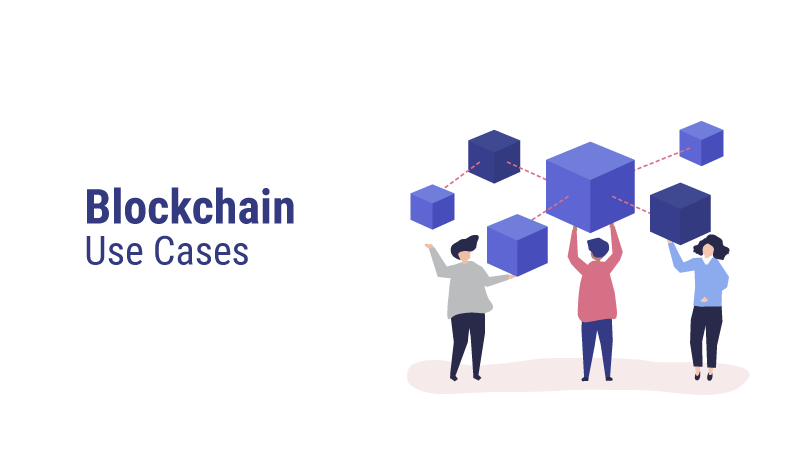Use Cases of Blockchain Technology

Blockchain is known to play a major role in cryptocurrency systems like Bitcoin to maintain safe and decentralized transaction records. Bitcoin is a major reason why blockchain has gained popularity in the last decade. It has emerged as a game-changing terminology for various industries including supply chain, health, education, IoT, and many more. The popularity and industrial applications of blockchain are booming because of its inherent advantages – a ledger that is decentralized and distributed is unchangeable and fully transparent. A blockchain network does not require a centralized authority to handle it. The information saved in the blockchain ledger can be cross-checked by anyone in the network. The bottom line is safe, reliable, and offensive to attackers.
Blockchain Use Cases
Blockchain is a powerful technology that offers many advantages to various industries. Here are some of the major use cases of blockchain:
Smart contracts
Smart contracts are similar to normal agreements. The only difference is that the contract guidelines are implemented on a blockchain in real time. This not only eliminates the need for intermediaries but also increases the level of liability for all the parties involved, which is impossible in traditional contracts. This is also cost-effective, saves time, and ensures compliance from all the parties involved. With the discovery of benefits offered by contract-based blockchain in different sectors, there has been an increase in its popularity. Some of the examples include BurstlQ in healthcare and Propy in real estate.
Internet of Things (IoT)
The next reasonable rise in blockchain applications takes place in the Internet of Things (IoT). IoT has a lot of applications and numerous security concerns and the proliferation of IoT products gives the greatest opportunity for hackers to loot your data on everything from Google’s Nest to a smart thermostat. Such data breaches can be avoided using blockchain-infused IoT that offers a great extent of security with the transparency of technology and virtual integrity to maintain things “smart”. Filament, HYPR, and XAGE security are some of the US companies that use blockchain in IoT to make it smarter and more secure.
Personal identity security
As per the reports, around 14.4 million Americans have been subjected to identity theft in a year, which indicates that 1 out of every 15 people is becoming the victim of identity fraud. This type of fraud can range from the forgery of documents to personal file hacking. The government can see a significant reduction in identity theft claims by storing sensitive data like social security numbers, certificates of birth, PAN, etc. in a decentralized and fixed blockchain ledger. Some blockchain-based initiatives at the forefront of identity security include Ligero, Illinois blockchain initiative, and Civic.
Healthcare
Blockchain in health care has played a significant role in managing patient data and security. With a huge number of data breaches and leaks, protecting personal data has become a serious concern for patients and hospitals. The transparency blockchain has offered gave assurance that changes in the information are clearly visible and cannot be meddled with. This way, blockchain technology has enabled the quick and secure provision of sensitive healthcare information to providers and patients, while giving privacy and transparency through encryption and sophisticated security codes. It also makes patient-provider communication efficient because of its decentralized nature. Since information is stored in multiple nodes, any change made in them will be updated in every node connected, thus helping to deliver updated information to doctors as well as patients.
Logistics
The use of blockchain in logistics systems and distribution networks allows easy tracking of goods. Though companies try to invest in tracking technology, the safety of the technology remains questionable as they lack a secure authentication process. This may give way to cyber criminals making use of network information. Blockchain guarantees you an appropriate authentication channel with verification. Plus, it facilitates live tracking of all your deliveries, thus ensuring a better customer experience. Moreover, it is also helpful in improving the national as well as international delivery processes while increasing their cargo capacity and their processing efficiency. If used properly, it will withstand a lot of adverse conditions that provide better transparency in logistics. This also builds reliability and trust between companies. With better transparency, invoice disputes will be reduced, labor exploitation will be reduced, and better auditing costs will be incurred.
Government
We have already mentioned the use of blockchain ledgers to secure crucial and sensitive data. But blockchains in the government sector have other uses as well. As reported by New York Times, blockchain can play a major role in enhancing the functional efficiency of bureaucracy, and accountability, and reducing large financial liabilities. Blockchain is also capable of cutting down millions of hours of red tape each year, using smart contracts to keep public officials responsible, and recording all activities to provide transparency. Moreover, blockchain-based voting can enhance the engagement of the public in elections as it provides the security and scrupulousness that enables voting from mobile devices. Voatz, the State of Delaware, and Follow My Vote are some of the companies and government agencies that use blockchain applications to improve government.
Media
The majority of prevailing issues in the media are related to intellectual property rights, data privacy, and royalty payments. As per the study conducted by Deloitte, media digitization is the triggering factor behind the widespread sharing of copyright-infringing content. According to Deloitte, blockchain can offer the media industry the facelift it needs in terms of copyrights, payments, and piracy. The power of blockchain in the media industry lies in its ability to block the presence of digital assets in different locations, such as mp3 files. It facilitates sharing the file while maintaining ownership as it is not possible to make piracy virtually with a transparent ledger system. In addition, blockchain enables advertisement agencies to aim at the target audience and musicians to gain appropriate royalty, thus maintaining data integrity. The companies that utilize blockchain in the media industry are MadHive, Steem, and Open Music initiative.
Money Transfer
The two best technology use cases of blockchain are money transfer and payment processing. Bitcoin-initiated, cryptocurrency transfer applications have gained much popularity in recent years. Blockchain technology enables transactions at a greater speech in real-time, thus saving time and money as it does not charge any transaction fee like most banks or financial institutions. It also supports faster and more secure cross-border payments (payments made between people in different countries), enables verify transactions that offer extra security, avoids any kind of intermediaries or third person between the payee and the payer, etc.
Wrap Up
Here we have discussed some major sectors that utilize blockchain in different ways. It has been proven that the advantages or uses of blockchain applications are not limited to cryptocurrency and bitcoin. The transparency and reliability it offers have impressed a lot of businesses that saved time and resources using blockchain technology. It is clear that blockchain is going to dominate the economy at some point in the future.
Get Started with our Blockchain Consulting ServicesBlogs by Category
AppForms Artificial Intelligence Blockchain Call Centers Chatbots Cloud Computing Data Management Design Digital Marketing Digital Transformation Enterprise Applications FinTech Insights LowCode Development Microsoft Mobile Apps News Office 365 Robotic Process Automation Security SharePoint Software Development Web ApplicationApplications of Blockchain Technology in the Healthcare Industry

2024-05-27 13:12:47